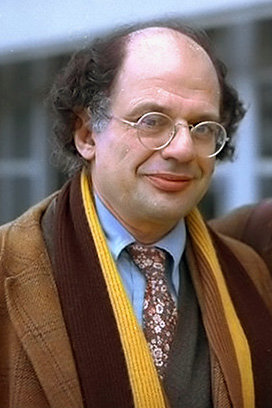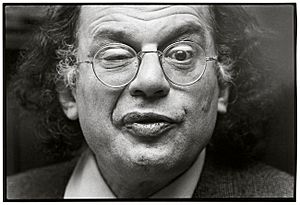Allen Ginsberg facts for kids
Quick facts for kids
Allen Ginsberg
|
|
|---|---|

Allen Ginsberg in 1978
|
|
| Born | Irwin Allen Ginsberg June 3, 1926 Newark, New Jersey, U.S. |
| Died | April 5, 1997 (aged 70) New York City, U.S. |
| Occupation | Writer, poet |
| Education | Columbia University (B.A.) |
| Literary movement | Beat literature, hippie Confessional poetry |
| Notable awards | National Book Award (1974) Robert Frost Medal (1986) |
| Partner | Peter Orlovsky (1954–1997; Ginsberg's death) |
| Signature | |
Irwin Allen Ginsberg (born June 3, 1926 – died April 5, 1997) was an American poet and writer. He was a key figure in the Beat Generation, a group of writers and artists in the 1950s.
Contents
Who Was Allen Ginsberg?
Allen Ginsberg was born in Newark, New Jersey. He grew up in Paterson, New Jersey. His father, Louis Ginsberg, was a schoolteacher and also wrote poetry. His mother, Naomi Levy, was born in Russia.
As a teenager, Ginsberg started writing letters to The New York Times. These letters were about important topics like World War II and workers' rights. He also published his first poems in a local newspaper. While in high school, Ginsberg became very interested in the poems of Walt Whitman.
In 1943, Ginsberg finished high school. He then went to Columbia University on a scholarship. To help pay for his education, he joined the Merchant Marine in 1945. At Columbia, he wrote for literary journals and won a poetry prize. He was also part of a literary and debate group.
What Was the Beat Generation?
During his first year at Columbia, Ginsberg met Lucien Carr. Lucien introduced him to other writers who would become part of the Beat Generation. These included Jack Kerouac and William S. Burroughs. They all shared a strong belief in the potential of young Americans. They felt this potential existed outside the strict rules of society after World War II.
The term "Beat" mainly refers to Ginsberg and his close friends. However, "Beat Generation" also includes many other poets Ginsberg met later. Some of these friends were David Amram and Diane di Prima. Other poets from different groups also became friends with Ginsberg.
What Did Allen Ginsberg Write?
Ginsberg's early poems were written in a formal style, much like his father's. He was inspired by Jack Kerouac to take his poetry more seriously. In 1955, Ginsberg decided to focus completely on writing poetry.
Soon after, he wrote a famous poem called Howl. This poem brought him and his Beat Generation friends to national attention. It also allowed him to work as a professional poet for the rest of his life.
Howl was a long poem about the social conditions in the United States in the 1950s. It started with the words, "I saw the best minds of my generation destroyed by madness." The poem described the frustration felt by many Americans, especially young people. It talked about problems like prejudice that needed to be discussed. Ginsberg published the poem and also read it aloud at public poetry readings.
Later in his life, Ginsberg taught poetry. He was a professor of English at Brooklyn College from 1986 until he passed away.
When Did Allen Ginsberg Die?
Ginsberg died on April 5, 1997. He was surrounded by his family and friends in his home in Manhattan. He passed away from liver cancer at the age of 70. Many people, including other artists, came to pay their respects. His ashes were buried in his family's cemetery plot in Newark.
What Awards Did Allen Ginsberg Receive?
Ginsberg received many honors for his writing. His collection of poems called The Fall of America won the U.S. National Book Award for Poetry in 1974. In 1979, he received a gold medal from the National Arts Club. He was also inducted into the American Academy of Arts and Letters.
In 1986, Ginsberg received the Golden Wreath award at a poetry festival in Macedonia. He was only the second American poet to get this award. In 1995, he was a finalist for the Pulitzer Prize for his book Cosmopolitan Greetings: Poems 1986–1992. In 2014, Ginsberg was honored on the Rainbow Honor Walk in San Francisco. This walk celebrates LGBTQ people who have made important contributions.
Images for kids
-
Ginsberg with his partner, poet Peter Orlovsky. Photo taken in 1978
-
Portrait with Bob Dylan, taken in 1975
-
Allen Ginsberg greeting A. C. Bhaktivedanta Swami Prabhupada at San Francisco International Airport. January 17, 1967
See also
 In Spanish: Allen Ginsberg para niños
In Spanish: Allen Ginsberg para niños
 | Ernest Everett Just |
 | Mary Jackson |
 | Emmett Chappelle |
 | Marie Maynard Daly |







